Unique in the deliberateness of its telling, EAST BAY is a very thoughtful and purposeful film from writer/director/editor/actor Daniel Yoon that beautifully utilizes mixed visual grammar and musical composition to metaphorically elevate and engage an already solid story and outstanding performances.
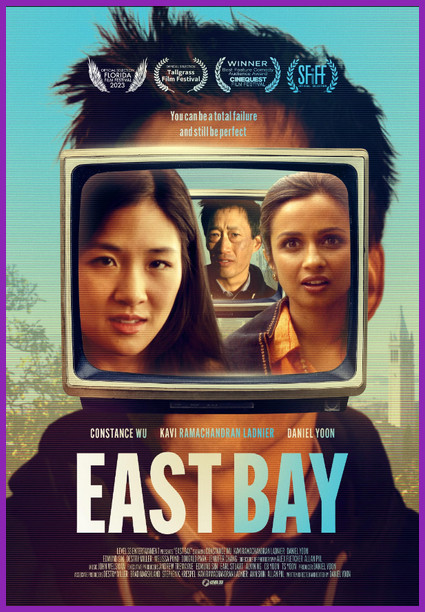
A wonderful character study that focuses on 39-year-old Jack Lee and his belief that he is a failure at everything in life; unlucky in love and in work, humiliated countless times, Jack is under the impression that success is defined only by what is seen on the outside and not what is on the inside. Exploring relationships through Jack’s observations and personal introspections, Yoon uses visual grammar and a mixed approach to story structure, treating us to a composed and deliberate metaphoric visual tonal bandwidth that brings not only Jack’s observations to life, but the lives of others whom he touches into focus.
Dumped by his girlfriend, unsuccessful as a filmmaker or any other vocation, and down on his luck and himself, Jack turns to his work colleagues Tim and Stuart for support, and a free couch. In his eyes, they have everything one could want. Their own apartment, a terrific friendship, jobs they like, and a carefree approach to life with smiles on their faces. The only thing Jack has that gives him any joy is a weekly pick-up game of ice hockey with Tim and Stuart and some other local guys. So what is he doing wrong? Why isn’t he happy all the time and successful? And that’s what Jack sets out to examine about himself and others.
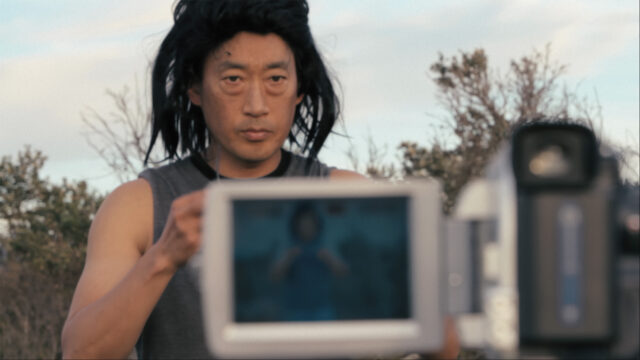
Living with Tim and Stuart is not the same as knowing them casually or as work buddies. Tim is a pothead and Stuart is obsessed with gaming, all of which Jack was unaware. Staying at home when they aren’t working, Jack sees that they really have no ambition and starts to wonder if they could be as unhappy as he is or are they failures, too. Nothing seems to bother them. In fact, Jack starts to wonder if the three of them are even friends.
Determined to find success for himself, Jack goes down the rabbit hole with a New Age self-help guru named Vivanti. He is smitten with her, hypnotized by the lipid pools of beauty with her constant direct gaze, his mind opening with her words of encouragement and empowerment. “I am God. You are God. You can be God. We all can be God.” Listening to Vivanti, it doesn’t take much for this puppy dog adoration to turn into what Jack sees as love. But like with Tim and Stuart, the private Vivanti is not what anyone sees on the outside. Physical beauty and beautiful words do not a whole stable person make.
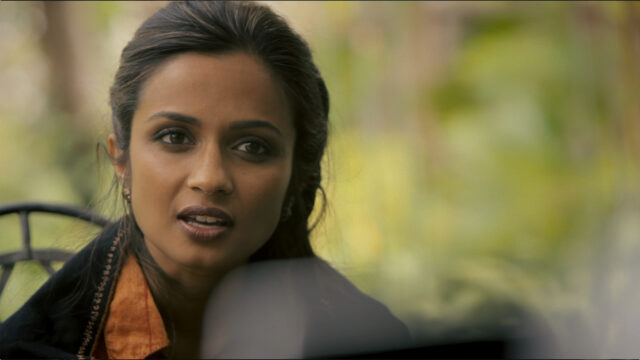
And then there’s Sara, a young film programmer for the local Asian American film festival. Every year, Jack submits a film. Every year, Sara raves and battles with the other two programmers to include his film in the festival. Her adoration for Jack appears genuine. But Jack doesn’t give Sara the right time of day and is standoffish and cold to her.
Yoon does a deep dive exploring each of these relationships from Jack’s somewhat disillusioned perspective. The most fascinating of these being that between Jack and his roommates, Tim and Stuart, due in large part to the performances of Edmund Sim and Destry Miller, respectively. Miller soars with deadpan comedic delivery and timing while Sim easily reminds you of a subdued Jimmy O. Yang. Together they are brilliant and put them in a room with Daniel Yoon’s Jack (yes, Yoon is the lead character) and they are perfect triumvirate.
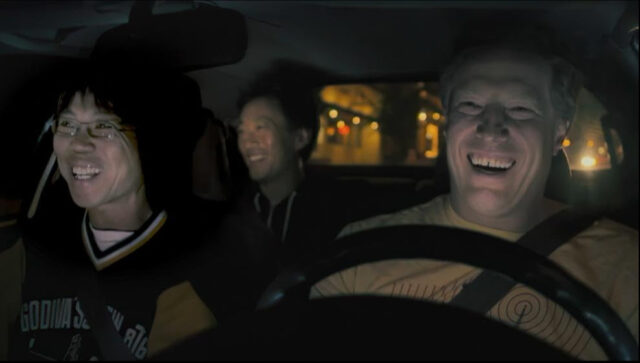
What makes Tim and Stuart so entertaining and engaging is that we see strong character arcs and are drawn to them, as is Jack, as they get under the skin while using pot and gaming as their coping mechanisms for life. And how fun is it to see Jack getting under their skins?
Bearing in mind that principal photography for EAST BAY was shot in 2010 before Constance Wu became a household name thanks to the mega-success of “Crazy, Rich Asians”, as Sara, the handwriting is on the wall for the success that Wu would become. She is charming, adorable, energetic, and above all, genuine in her emotion. Sara’s excitement over seeing Jack at the film festival office is palpable and resonant. This is a performance rooted in sincerity and joy. But Wu also goes through a metamorphosis as Sara and showcases her talents as emotions run to the other end of the spectrum.
And what of Daniel Yoon as Jack Lee? No one but Yoon could have played this part with as much questioning and sometimes hapless gravitas that sets the stage for what unfolds.
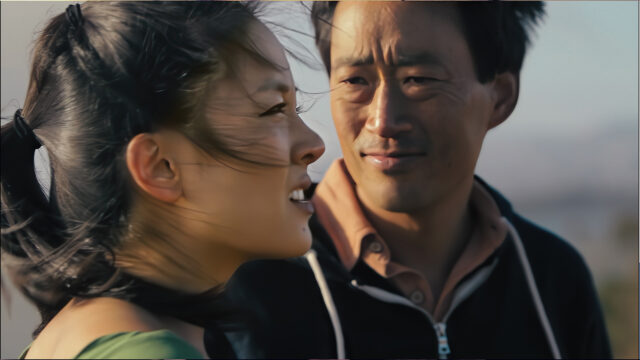
Character growth on every level is evident and believable. No one stagnates. There is non-stereotypical depth with each. While most grow, there is one character who regresses which provides a nice revelatory respite as truths emerge, but it’s all welcome. Each character is interesting and likable and at heart, good people that we just happen to see in difficult situations that cause each to react in a way that breaks down the public facade and brings out the worst within them as each makes poor judgment at times. But will Jack ever come to grips and find his real happiness and get over being a self-perceived failure?
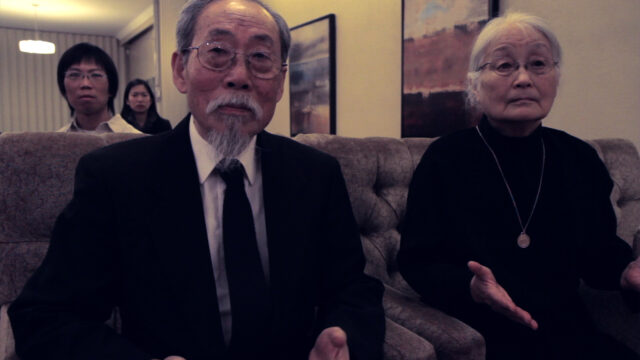
Working with Yoon, cinematographers Alexander Fletcher and Allan Piil deliver a stunning metaphoric palette. The visual grammar is telling and its language is integrated so well into the overall story. When Vivanti is on screen, everything is golden-hued and beautiful, close-ups and ECUs are used to captivate and even annoy us with Vivanti’s gushing of positivity and emotional persuasiveness as if she’s osmotically infiltrating each person who comes in contact with her. Contrasting that is starker, brighter white light around Tim and Stuart and their apartment, creating a harshness that embraces the vacuous nature of their existence. Sara is generally shot with a mid-two shot with room to breathe that feels like Jack putting distance between him and her. Visual tonal adjustments help steer the emotional notes of the film allowing us to feel different things for different characters, yet still feel cohesive. Some nice visual effects complete the visual picture of Jack’s sometimes hallucinogenic mind, adding a layer of internal confusion that buttresses the character and Yoon’s performance.
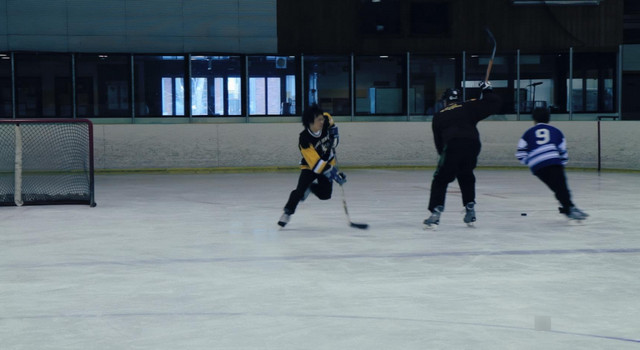
And dare I say that the hockey scenes are ebullient with just the guys on the ice, playing for themselves, and feeling free. But they are each moving. Moving forward on the ice as they should be doing in life.
Also serving as editor, Yoon worked on the film for a number of years after the principal photography in 2010, followed by rewrites to fill in gaps after a rough cut, and then some pick-up shots during/after Covid. The result is a pace that is purposeful and deliberate in its intention and serves this story well.
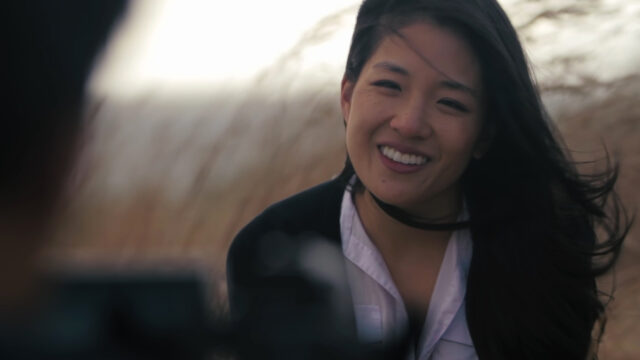
John Welsman’s score is just one more element of EAST BAY that is well thought out. Interestingly, the music serves as a counterpoint to what was happening on screen, yet giving the audience a feeling of warmth, positivity, and hope. The contrasting music, in composition and instrumentation, is particularly important when it comes to Jack. We feel the beauty of the world while he has his head in the sand or under a rock. It’s an interesting way to complement this story, but it proves very effective.
Written and Directed by Daniel Yoon
Cast: Constance Wu, Daniel Yoon, Edmund Sim, Destry Miller, and Kavi Ramachandran Ladnier
by debbie elias, 05/05/2024
EAST BAY is currently in select theatres and will be available on VOD on May 31, 2024.












